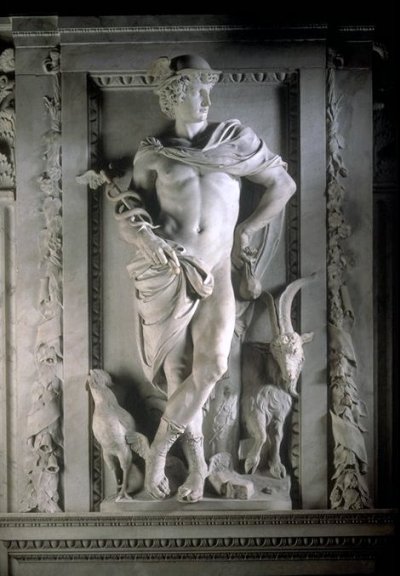
This week, my mythological post is on Hermes, the messenger of the Greek gods. Well, one of them, anyway. The rainbow goddess Iris was also regarded as a messenger. While best known for his message delivery, performed with wingéd sandals at the speed of...well, something fast, he had several other functions as well. He was the guide of souls to the world of the dead (which is presumably why he, rather than Zeus, tended to be associated with the Norse Odin), as well as the god of travel, trade, commerce, and thieves (and anyone who has any familiarity with business news will understand that those things go together better than it might look at first). In his youth, he invented the lyre and stole his half-brother Apollo's cattle. Many myths concerning Hermes involve his assisting heroes with their quests. The messenger god was also an accomplished athlete, credited with inventing foot-racing and boxing. I'm inclined to think sports that simply consist of running or punching can't really be said to have a single inventor, god or not, but don't tell Hermes that.

It was presumably around the time the Greeks conquered Egypt that the idea of Hermes Trismegistus, a sort of amalgamation of Hermes and the Egyptian Thoth, was first conceived. The Greeks had a tendency to identify the gods of other lands with their own, and Hermes and Thoth were both associated with writing and magic. The Hermetic writings that were attributed to the amalgamated deity included both philosophy and pseudo-scientific magic, including alchemy and astrology. These writings were popular in the Middle Ages and the Renaissance, but lost status when analysis revealed that they weren't as ancient as previously thought. The modern New Age movement, however, has apparently revived the idea that the writings date back to the time of the pharaohs. Hermeticism is just like any other trend, I suppose. Just when you think it's gone for good, it resurfaces stronger than ever.

It isn't only through occultism that Hermes and his Roman equivalent Mercury live on, however. I've seen the god's image used for various delivery services, and he apparently remains the symbol of the Greek post office. The words "hermeneutics" derives from his name, while Mercury is the namesake for both the planet closest to the Sun (and hence the fastest in its orbit) and the lethal liquid metal once commonly known as quicksilver. And I'm sure the geeky writers of Futurama were aware of the mythological connections inherent in a character named Hermes managing a delivery company, hence calling to mind the functions of the mythological figure as both messenger and god of commerce. I seem to recall hearing that the character originally had a different name and wasn't Jamaican. So is Hermes actually a common Jamaican name, or will that not be the case for another several hundred years?




